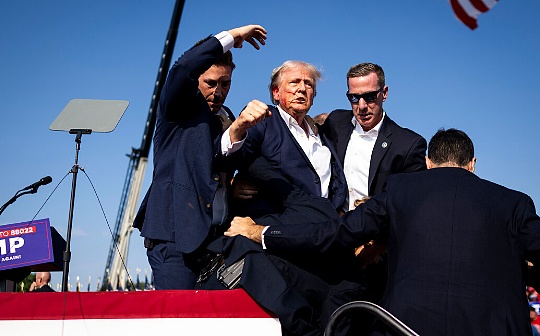
Author: Jessy, Bitchain Vision
The bullet passed through the upper part of Trump’s right ear. At 6:11 pm Eastern Time on July 13, 2024, Trump was assassinated.
At that time, Trump could not only influence the US politics, but also profoundly influence the direction of the crypto industry.After Trump’s assassination, the market that had been sluggish for several weeks suddenly rebounded, and Bitcoin broke through $66,000 in a short period of time on July 17.The positive expectations related to the US election have been advanced.
In the early years, Trump criticized encryption, but now he has become a fan of encryption.Currently, there are more than 50 million cryptocurrency holders in the United States. It is very realistic to consider that in order to win the votes of these people, Trump should also support encryption.
According to current U.S. public opinion, the probability of Trump being elected president is very high.Trump’s promise of support for encryption after election is a major benefit to the industry.A president’s support for encryption will promote accelerated compliance and rapid popularization of the crypto industry.
In the last bull market, Musk was the strongest cryptocurrency sales champion, and he made Doge famous.In this bull market, Trump undoubtedly took over Musk and became a cryptocurrency vane.
ICON in the industry has gone from industry insiders, to business tycoons, to former US presidents, which is a sign that the industry is gradually moving towards mainstream.Trump’s current position in the crypto industry indicates that the development of the crypto industry is becoming increasingly deeper and more political and national binding.
First is businessman Trump, then the presidential candidate
Racism, inciting huge profits, obvious misogyny, anti-environmentalism… These are all negative labels on Trump. In the increasingly divided and radical United States, these labels on him just cater toThe interests of most Americans are now.
Trump is even a very smart businessman. He does not pay attention to values or political correctness, but rather to actual interests.Its specific policies such as boosting the economy and reducing the unemployment rate are indeed in the interests of most American people.
Such Trump has been welcomed by young voters.As a businessman, or to cater to their voters, choosing to support and embrace encryption is a very wise decision.By sorting out Trump’s attitude towards encryption, we can clearly feel that his attitude towards encryption has always been driven by interests.
During the first presidency, Trump was still opposed to the crypto industry.At that time, he criticized crypto assets on social media and said that he would not hold any cryptocurrency.In those years, looking around the world, the attitude towards the crypto industry was more boycotted than accepted. Governments from the perspective of preventing financial risks, gave yellow card warnings to virtual currencies.As the leader of a country, Trump’s remarks represent the attitude of a country.
In 2021, after Trump stepped down, it was the NFT wave, and Trump also participated in it deeply, and issued three NFTs related to him, making a fortune.At that time, Trump’s businessman nature was highlighted in his attitude towards the crypto industry.
By this year’s election year, both Trump and Biden said that they will be crypto-friendly after taking office.At a time when encryption is becoming more and more popular, it is not a wise approach to deviate from the times.Expressing a crypto-friendly attitude is undoubtedly an important means to win votes and is in the interests of the American people and the government.
Although Trump is a presidential candidate, his identity that cannot be ignored is a businessman. This is his biggest label. Encryption is first of all, and then political chips.This year, Trump said he will launch his fourth series of NFTs.In Trump’s view, the previous three series of NFTs were all successful, “spent 45,000 copies in one day.”
Let’s look at Biden again. It was during his time to take office that the SEC conducted strict investigations and prosecutions on leading institutions in the crypto industry, such as Binance.During this campaign, he also expressed his support for encryption.
These politicians’ change in attitude towards encryption can be seen earlier from the change in attitude towards encryption by their parties, and politicians are not isolated.
On May 22 this year, the U.S. House of Representatives passed the 21st Century Financial Innovation and Technology Act (“FIT21”).This is a landmark crypto market legislation.The bill aims to establish a comprehensive regulatory framework for digital assets.The bill received bipartisan support and received 279 votes in favor (67%), an incident that also shows that cryptocurrencies are becoming increasingly important in the political landscape, and both parties’ attitudes towards crypto have undoubtedly turned to support.
The rapid turn of the two parties to support cryptocurrencies, the most direct promotion was the SEC’s approval of the Ethereum spot ETF, another industry milestone.
The original intention of politicians to support encryption is not important, the result is more important.
The last bull market, Musk was the ICON of the crypto industry. By this bull market, the baton had already been passed to Trump.This change shows that the crypto industry is becoming increasingly influential, from affecting the business society to affecting today’s political arena.
For the United States, embracing encryption itself is in the interests of the United States.As the next US president can truly achieve crypto-friendliness, Web3 will also take another big step towards compliance, and encryption will also affect more and more people and society.
Encryption is no longer a small group of geeks’ plaything, it is moving to the mainstream.
Embracing encryption is also a profit-seeking behavior of the US government
In an exclusive interview with Bloomberg, Trump said he did not want other countries to take over the crypto industry.In recent years, the United States has indeed become an unquestionable center, big brother and rulemaker in the crypto industry.
To become the big brother of the industry, the strategy adopted by the United States is to first severely punish and investigate, so that the industry knows that the United States has the final say and the industry must listen to the United States.By controlling the main institutions in the industry, they will promote the development of the industry and “ensure that Web3 occurs in the United States.”In an interview, Trump compared the crypto industry to a baby, and what the United States does is to make the crypto industry grow into an “American” under the surveillance and guidance of the United States.
During the last round of bear market, the United States was not friendly to the crypto industry, and the regulatory heavy hammer has never left.
First is the Securities and Exchange Commission (SEC), which is one of the most authoritative committees in the field of financial regulation in the United States. It has absolute authority in the economic field and is an independent judicial system.Its supervision of the crypto industry was first based on the Securities Law, deeming virtual assets as securities, and then imposing penalties on the grounds that virtual assets violated the Securities Law.
Since 2022, the Securities and Exchange Commission has conducted an investigation into whether some crypto assets on Binance, Coinbase and other platforms are unregistered “securities”.After Ethereum transferred from POW to POS, the SEC determined that it belonged to “securities”, and recently determined that FTX’s token FTT belonged to “securities”, thus deeply involved in FTX’s bankruptcy restructuring case.
The SEC has been suing leading industry institutions. In the first half of 2023, it sued many large institutions such as Genesis, Kraken, Binance, and Coinbase. For example, Coinbase was accused by it of illegally operating crypto-asset securities business without registration.; Prosecuting Ripple’s token sale behavior violates the Securities Act.And it is not only regulating the United States, but its hands are very long. Previously, Telrgram’s token for raising funds was identified as a securities, so it adopted regulatory enforcement on Telegram’s issuance and fundraising on the grounds of protecting the interests of US investors.
The second is the US Commodity Futures Trading Commission (CFTC), which is mainly responsible for supervising the US commodity futures, options, financial futures, and options markets.In 2021, the CFTC filed a lawsuit against Tether and Bitfinex exchanges, accusing the two companies of fabricating transaction volume and misappropriating customer funds and suspected of violating anti-money laundering laws, etc.In 2020, the CFTC, the FBI, and the U.S. Department of Justice jointly sued BitMEX and its founding executives for failing to implement compliance measures, violating the Anti-Money Laundering Act and the Anti-Terrorism Act.
In March 2023, the CFTC also filed a lawsuit against Binance for reasons such as non-compliant options, futures trading, violation of KYC, and anti-money laundering compliance obligations.It also participated in the lawsuit against FTX.
It is precisely under such strict investigation and control that the currency circle has suffered from darkest moments again and again.Especially in the past two years of 2022 and 2023, the SEC and CFTC of the United States strictly reviewed the currency exchanges and conducted a year-long investigation on platforms such as Binance and Coinbase. In 2023, the SEC sued again.Binance and founder Zhao Changpeng have both dealt a heavy blow to the crypto industry.
From the current attitude of presidential candidates toward encryption, the two parties in the United States turned to support encryption in May this year, and then looked back at the previous strict supervision of the crypto industry in the United States.It can be clearly felt that the United States was initially strict with encryption and long-arm jurisdiction, which was ostensibly to protect the interests of Americans and prevent financial risks, but these behaviors actually put the control of the encryption industry in the hands of the United States itself..After taking power, use loose policy support to promote industry development to ensure that “Web3 occurs in the United States.”
Currently, the crypto industry has an extremely high penetration rate in the United States, which, according to TripleA, has more than 52 million cryptocurrency users and ranks among the top in terms of ownership proportions.In the United States, cryptocurrencies are mainly owned by the wealthy class, with most holders having high education.
The United States is also the government that holds the most Bitcoins.In terms of computing power, the United States has mastered nearly 40% of Bitcoin’s computing power and ranks first.The virtual currency spot ETF it launched has the largest amount of funds.In terms of crypto venture capital, Galaxy Digital data shows that there are 324 venture capital companies in the United States focusing on cryptocurrencies, far exceeding the 66 in Singapore, which ranks second.
As encryption and the country become increasingly tied to deeper, the crypto industry will undoubtedly stay away from the original intention of Satoshi Nakamoto when he typing the code in 2008.With the support of the national government, Bitcoin will become more and more mainstream. Although the code of Bitcoin will not be changed, Bitcoin has finally been incorporated by traditional finance and was recruited by the countries it initially wanted to confront.








